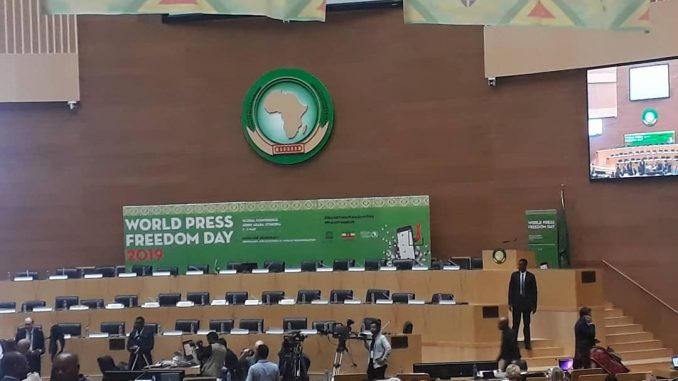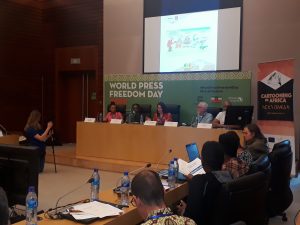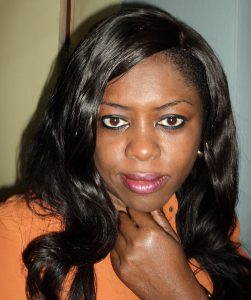
Many across the globe would agree that the news media is facing what may be registered as its most challenging period. Newspaper sales are at a low, with an increasing number of people relying less on TV news bulletins and the radio managing to stay relevant with the advent of smart phones. Another problem journalism is dealing with is the description of unfavorable stories as ‘fake news’, especially by high ranking government officials and top personalities. Of course, the originator of the term, ‘fake news’ being the President of the United States of America and leader of the free world, Donald J. Trump.
Gladly, if the current state of mind of journalists is to be judged by the vibrancy that characterized the three-day event to commemorate the World Press Freedom Day in Addis Ababa, Ethiopia, then it’s safe to say pen pushers aren’t intimidated by the new challenges they face.

This year’s celebration of the World Press Freedom Day, which had at its theme-Media For Democracy: Journalism and Elections in Times of Disinformation, had thousands of journalists and other stakeholders in attendance. There hardly were dull moments or much room for boredom as participants moved in between sessions that attracted their attention. Having checked in and out of different sessions, I can say journalists and other delegates asked questions as well as made contributions that point to the majority still seeing the news media as useful and relevant to running a decent society.
I was one of the eight panelists at a session with the topic: Best Practices on Election Reporting When Stakeholders Come Together. Also on the panel for the dialogue organized by the Media Foundation for West Africa (MFWA) and International Media Support restructuring (IMS) was the outspoken, high ranking police officer from Ghana, C.O.P Nathaniel Kofi Boakye, the meticulous programme officer from MFWA Vivian Affoah , from the Zimbabwean Electoral Commission came Ms. Joyce Laetita. Also from Zimbabwe but working for the IMS was Simbiso Marimbe. Then there was Tore Bergsaker founder of the Norwegian Fact Checker Initiative, Finn Rasmussen of IMS and the Executive Director of IMS, Jesper Hojberg, who moderated the discussion, while panelists took turns to speak on the challenges of conducting credible polls in their countries. It was an interview styled session which gave opportunity for attendees to ask panelists questions and to make comments after their presentations.
I spoke on the Nigerian experience of policing and reporting elections as well as reporting the electoral process professionally. I concluded my short remark by hinting that Nigeria will soon inaugurate its National Committee on the Protection of Journalists.

Interestingly, Media Foundation for West Africa and the International Media Support in conjunction with the Nigeria Union of Journalists (NUJ), hosted pre and post elections meetings with the media and the police as the lead security agency. Both meetings were held in Abuja and it was during the April, post-election parley between journalists and police officers majority of whom are spokespersons at the state and zonal level, that the National President of the NUJ, Chris Isiguzo announced the plan to resuscitate the National Committee for the Protection of Journalists.
Isiguzo disclosed at the meeting, that there wasn’t any report of police manhandling journalists during the elections, saying however that there are plans to bring the committee to protect journalists back to life. He was optimistic that this time around, the committee will not go under, as it would have representation from relevant government and non-governmental organisations.
Like I mentioned during my presentation as part of the panel, the move to institute a committee to ensure the safety of journalists in Nigeria was my take-away from both meetings in Abuja. Beyond elections, beyond the frank exchange among participants on why security personnel and reporters clash from time to time, the NUJ and security agencies must have a platform where issues are trashed out and modalities for a cohesive relationship are developed.
If the NUJ and other stakeholders such as the Nigerian Guild of Editors and Newspaper Proprietors Association of Nigeria and Broadcasting Organizations of Nigeria haven’t realised, unlike majority of those involved in organizing the 2019 edition of the World Press Freedom Day, the reign of democracy in Africa hasn’t secured the position of the news media. In a unpleasant twist, the news media in the classic definition has suddenly found itself struggling with accusations of bias and even claims of media houses disseminating fake news (which many at the World Press Freedom Day celebration preferred to describe as misinformation, especially from the social media).
Away from Africa, the rise of populism has also seen the media waking up to the need to showing its importance in an egalitarian society, even as it is starting to see reasons to recommence sensitizing the public on issues far apart like immunization and the dangers of extremism.
Journalism as we once know it is also fighting to survive the onslaught of simply presented news. If reporters cringe over posts by overzealous citizen journalists on social media and blogs, I wondered what they would say on the use of Artificial Intelligence in news rooms. I attended a session organized by IMS on AI, Journalism and Press Freedom During Elections, where I learnt that Reuters is already using AI for stories from less important sport events.
Ultimately, press freedom for me must be protected by key stakeholders. Here in Nigeria, automated journalism may not be a threat, not even citizen journalism, but we certainly have to ensure the safety of reporters.
We have a history that makes necessary, the institutionalization of the protection of journalists. Just to mention a few, in August 2018, a security reporter with Premium Times, Samuel Ogundipe, was detained by police. He was asked to disclose the source of a story the police high command found embarrassing. He was released following condemnations coming from local and international watchers.
Samson Unanka, a reporter with The Sun was assaulted and locked up by policemen in January 2018. Unanka was covering a protest in Enugu North LG, Enugu State, when he was picked up, beaten and detained.
Jones Abiri’s case is one that stands out. Abiri who is the publisher of Weekly Source Magazine was detained by Nigeria’s secret police, better known as the Department of State Service (DSS). After intensive advocacy by activists and journalists, Abiri was charged to court and granted bail in August 2018. But he was again arrested in March this year by the DSS.
It is my expectation that the National Committee on the Protection of Journalists will be the lead group for reacting to unwarranted attacks on journalists. I also envisage a committee that will come up with and regularly update the protocol on press freedom and the protection of journalists. The committee should also see the domestication of the Freedom of Information Bill by states as top priority. Many journalists have faced harassment when asking for information on what those in government often term as sensitive issues. Often times media houses have to deal with issues of harassment of their staff with the support of the NUJ. But with the committee, there will be an organization which can react faster and effectively deal with cases of harassment.
I expect that as planned, the committee will have representatives from security agencies and other relevant government bodies, who will contribute ideas on ensuring mutual respect and an understanding of the roles of players in the democratic process. Discussions at the last meeting in Abuja signal that this committee may be inaugurated, with its the terms of reference spelt out at an upcoming meeting also to be organized by MFWA and IMS.
I found out through little research, that the committee for the protection of journalists in the U.S. is run as an NGO. The fact that the NUJ is resuscitating this committee might be the right foundation for it to start as an independent group and with the right level of support transform into an NGO. But my suggestion here maybe preemptive as the NUJ is yet to make any statements on the setup and modus-operandi of the committee. Suffice to say that the committee must be made up of experienced and committed representatives from relevant agencies. The committee must be run transparently to attract and maintain support.
The current leadership of the NUJ should be supported by lovers of democracy to bring the committee on the protection of journalists back on stream. The idea of this committee may not attract the attention of Nigerian journalists as much as calls for insurance cover, a housing scheme or even a committee to ensure prompt payment of salaries of staff of media houses. For some, the idea of a committee on the protection of journalists may sound academic, but I believe this committee is vital to the survival and relevance of the Nigerian media. It will be more useful if the committee is up and running well ahead of the 2023 election, as the 2019 World Press Freedom Day theme reminded journalists of the application of elections as yardsticks in a democracy and the fact that the media can also measure its relevance using electoral circles.
Kemi Yesufu is Editor-in-Chief of Frontline News Online. She can be contacted on: [email protected]






Be the first to comment